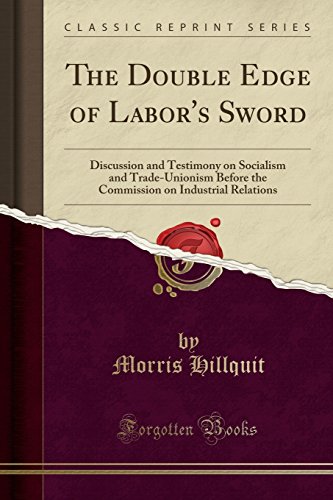Background
Hillquit was born on August 1, 1869 in Riga, Latvia, Russian Empire (now Latvia). He was the son of Benjamin and Rebecca (Levene) Hillkowitz; the family name was legally changed later to Hillquit. The father was a teacher.



(Excerpt from History of Socialism in the United States ...)
Excerpt from History of Socialism in the United States Since the first appearance of this book (october, four editions of it have been printed without any change in the text. But now, when my publishers are about to send it out into the world for the fifth time, I feel that the task of subjecting it to a thorough revision can no longer be delayed. There are several reasons why such revision should be undertaken at this time. The last six years have been years of uncommon interest and eventfulness for the socialist movement of this country, and no history of the movement can claim to be complete without at least a brief record of these events. The task of bringing the narrative down to date has made necessary the addition of an entirely new and somewhat extended chapter. About the Publisher Forgotten Books publishes hundreds of thousands of rare and classic books. Find more at www.forgottenbooks.com This book is a reproduction of an important historical work. Forgotten Books uses state-of-the-art technology to digitally reconstruct the work, preserving the original format whilst repairing imperfections present in the aged copy. In rare cases, an imperfection in the original, such as a blemish or missing page, may be replicated in our edition. We do, however, repair the vast majority of imperfections successfully; any imperfections that remain are intentionally left to preserve the state of such historical works.
https://www.amazon.com/History-Socialism-United-Classic-Reprint/dp/0265424607?SubscriptionId=AKIAJRRWTH346WSPOAFQ&tag=prabook-20&linkCode=sp1&camp=2025&creative=165953&creativeASIN=0265424607

(Leopold is delighted to publish this classic book as part...)
Leopold is delighted to publish this classic book as part of our extensive Classic Library collection. Many of the books in our collection have been out of print for decades, and therefore have not been accessible to the general public. The aim of our publishing program is to facilitate rapid access to this vast reservoir of literature, and our view is that this is a significant literary work, which deserves to be brought back into print after many decades. The contents of the vast majority of titles in the Classic Library have been scanned from the original works. To ensure a high quality product, each title has been meticulously hand curated by our staff. This means that we have checked every single page in every title, making it highly unlikely that any material imperfections – such as poor picture quality, blurred or missing text - remain. When our staff observed such imperfections in the original work, these have either been repaired, or the title has been excluded from the Leopold Classic Library catalogue. As part of our on-going commitment to delivering value to the reader, within the book we have also provided you with a link to a website, where you may download a digital version of this work for free. Our philosophy has been guided by a desire to provide the reader with a book that is as close as possible to ownership of the original work. We hope that you will enjoy this wonderful classic work, and that for you it becomes an enriching experience. If you would like to learn more about the Leopold Classic Library collection please visit our website at www.leopoldclassiclibrary.com
https://www.amazon.com/Socialism-Promise-Menace-Morris-Hillquit/dp/B01JNHAVPO?SubscriptionId=AKIAJRRWTH346WSPOAFQ&tag=prabook-20&linkCode=sp1&camp=2025&creative=165953&creativeASIN=B01JNHAVPO

(Excerpt from Socialism in Theory and Practice The histor...)
Excerpt from Socialism in Theory and Practice The history of our civilization presents one unbroken chain Of social changes. The interval between the primi tive tribe of cave-dwellers and modern industrial society is filled with a variety of intermediate social types. Each of these types constitutes a separate phase of civilization. Within the same civilization each type is superior to the one preceding it, and inferior to the one succeeding it. Each phase of civilization is evolved from the preceding phase and gives birth to the succeeding phase. Each phase of civilization passes through the stages of formation, bloom, and decay. About the Publisher Forgotten Books publishes hundreds of thousands of rare and classic books. Find more at www.forgottenbooks.com This book is a reproduction of an important historical work. Forgotten Books uses state-of-the-art technology to digitally reconstruct the work, preserving the original format whilst repairing imperfections present in the aged copy. In rare cases, an imperfection in the original, such as a blemish or missing page, may be replicated in our edition. We do, however, repair the vast majority of imperfections successfully; any imperfections that remain are intentionally left to preserve the state of such historical works.
https://www.amazon.com/Socialism-Theory-Practice-Classic-Reprint/dp/0364547669?SubscriptionId=AKIAJRRWTH346WSPOAFQ&tag=prabook-20&linkCode=sp1&camp=2025&creative=165953&creativeASIN=0364547669

(On the first day of A pril, 1920, the lower house of the ...)
On the first day of A pril, 1920, the lower house of the legislature of the State of New York by an overwhelming vote adopted a resolution expelling the five Socialists who had been elected members of that body. The imprecedented action was the culmination of a sensational political proceeding, which was followed with tense interest by the whole country. It had its inception on the opening day of the legislative session, January 7th, 1920y when the Speaker of the A ssembly, Thaddeus C. Sweet, without preliminary debate or notice of any kind, suddenly ordered the Socialist members to the bar of the House and coolly informed them that they would not be allowed to take their seats in the Assembly on the groimd that they had been elected upon a platform that is absolutely inimical to the best interests of the State of New York and of the United States, The Speaker was immediately followed by the majority leader of the A ssembly, who offered a resolution in substance condemning the Socialist Party as a revolutionary and impatriotic organization, and directing that the seats of the Socialist Assemblymen be declared vacant pending the determination of their qualifications and eligibility. The resolution was passed with only six dissenting votes. After thus convicting a whole political party without trial, the entire matter was referred to the Judiciary Committee of the Assembly for investigation a sort of post-mortem inquest. (Typographical errors above are due to OCR software and don't occur in the book.) About the Publisher Forgotten Books is a publisher of historical writings, such as: Philosophy, Classics, Science, Religion, History, Folklore and Mythology. Forgotten Books' Classic Reprint Series utilizes the latest technology to regenerate facsimiles of historically important writings. Careful attention has been made to accurately preserve the original format of each page whilst digi
https://www.amazon.com/Socialism-Classic-Reprint-Morris-Hillquit/dp/B008NHC10E?SubscriptionId=AKIAJRRWTH346WSPOAFQ&tag=prabook-20&linkCode=sp1&camp=2025&creative=165953&creativeASIN=B008NHC10E

(Loose Leaves from a Busy Life Hillquit, Morris ( Author )...)
Loose Leaves from a Busy Life Hillquit, Morris ( Author ) Paperback 2012
https://www.amazon.com/Loose-Leaves-Busy-Morris-Hillquit/dp/1258421879?SubscriptionId=AKIAJRRWTH346WSPOAFQ&tag=prabook-20&linkCode=sp1&camp=2025&creative=165953&creativeASIN=1258421879

(Excerpt from Socialism Summed Up The Socialist movement ...)
Excerpt from Socialism Summed Up The Socialist movement was called into life by eco nomic conditions which have sprung up within very recent periods. Its program is an attempted solution of the problems inherent in these conditions. About the Publisher Forgotten Books publishes hundreds of thousands of rare and classic books. Find more at www.forgottenbooks.com This book is a reproduction of an important historical work. Forgotten Books uses state-of-the-art technology to digitally reconstruct the work, preserving the original format whilst repairing imperfections present in the aged copy. In rare cases, an imperfection in the original, such as a blemish or missing page, may be replicated in our edition. We do, however, repair the vast majority of imperfections successfully; any imperfections that remain are intentionally left to preserve the state of such historical works.
https://www.amazon.com/Socialism-Summed-Up-Classic-Reprint/dp/1333216645?SubscriptionId=AKIAJRRWTH346WSPOAFQ&tag=prabook-20&linkCode=sp1&camp=2025&creative=165953&creativeASIN=1333216645

(Excerpt from The Double Edge of Labor's Sword: Discussion...)
Excerpt from The Double Edge of Labor's Sword: Discussion and Testimony on Socialism and Trade-Unionism Before the Commission on Industrial Relations It was one of the most striking measures of modern legislation involving, as it did, an official recognition of the existence of a general and chronic industrial nu rest and representing the first attempt at a general stock-taking of industrial conditions and relations in the United States. The act specified that the Commission Shall be composed of nine persons, to be appointed by the President of the United States, by and with the advice and consent of the Senate; not less than three of whomshall be employers of labor and not less than three of whom shall be representatives of organized labor. About the Publisher Forgotten Books publishes hundreds of thousands of rare and classic books. Find more at www.forgottenbooks.com This book is a reproduction of an important historical work. Forgotten Books uses state-of-the-art technology to digitally reconstruct the work, preserving the original format whilst repairing imperfections present in the aged copy. In rare cases, an imperfection in the original, such as a blemish or missing page, may be replicated in our edition. We do, however, repair the vast majority of imperfections successfully; any imperfections that remain are intentionally left to preserve the state of such historical works.
https://www.amazon.com/Double-Edge-Labors-Sword-Trade-Unionism/dp/1331479037?SubscriptionId=AKIAJRRWTH346WSPOAFQ&tag=prabook-20&linkCode=sp1&camp=2025&creative=165953&creativeASIN=1331479037

(Excerpt from From Marx to Lenin The Object Of this bookl...)
Excerpt from From Marx to Lenin The Object Of this booklet is to clarify the main issues and problems Of the present-day Socialist movement. About the Publisher Forgotten Books publishes hundreds of thousands of rare and classic books. Find more at www.forgottenbooks.com This book is a reproduction of an important historical work. Forgotten Books uses state-of-the-art technology to digitally reconstruct the work, preserving the original format whilst repairing imperfections present in the aged copy. In rare cases, an imperfection in the original, such as a blemish or missing page, may be replicated in our edition. We do, however, repair the vast majority of imperfections successfully; any imperfections that remain are intentionally left to preserve the state of such historical works.
https://www.amazon.com/Marx-Lenin-Classic-Reprint/dp/1332892876?SubscriptionId=AKIAJRRWTH346WSPOAFQ&tag=prabook-20&linkCode=sp1&camp=2025&creative=165953&creativeASIN=1332892876
Hillquit was born on August 1, 1869 in Riga, Latvia, Russian Empire (now Latvia). He was the son of Benjamin and Rebecca (Levene) Hillkowitz; the family name was legally changed later to Hillquit. The father was a teacher.
Hillquit's earliest education was German, but in 1881 he entered the Alexander-Gymnasium, the only Russian school in Riga. In 1886, at the age of seventeen, he emigrated to America, and spent the next decade on New York's East Side.
He entered a public school, but left after a short time to help support his family. Most of his education during those first years was gained on the roofs of the Cherry Street tenements, where the young immigrant intellectuals gathered to discuss the respective merits of various left-wing philosophies.
After leaving high school, he worked in a shirt factory and later for a picture-frame company. His first real security, he says in his autobiography, came with his first political job--a four-dollar-a-week clerkship in the office of the Socialist Labor party. There he got to know socialist literature and the organizational problems of the trade-union movement. A few months later he went to work for the Arbeiter Zeitung, the first American-Yiddish newspaper. For five dollars a week he served as promoter, business manager, associate editor, and poet.
In the meantime, in 1891, he had entered the law school of the University of the City of New York. He graduated in 1893, but before that time he had left the Arbeiter Zeitung to give his complete attention to socialist politics.
Hillquit settled in New York and changed his name to Morris Hillquit. He became involved in left-wing politics. This included working for the Socialist Labor Party and establishing the United Hebrew Trades, a trade union for Jewish garment workers.
According to Barbara Gelb, the author of So Short a Time (1973), Hillquit "made his legal reputation as a defense lawyer in some of the prominent labor disputes of the 1900s. " In 1901 Hillquit joined with Eugene Debs and Victor Berger to establish the Socialist Party of America. The party's leading theoretician, he wrote History of Socialism in the United States (1903), Socialism in Theory and Practice (1909) and Socialism Summed Up (1912).
Hillquit was totally opposed to the Industrial Workers of the World and of the faction that urged labour activity independent of the American Federation of Labor. He led the campaign to have William Haywood removed from the National Executive Committee of the Socialist Party of America. Over the next few years he continued to argue that socialism would be achieved through the democratic system.
A strong opponent of United States involvement in the First World War, Hillquit help defend members of his party charged under the Espionage Act. In 1917, The Masses came under government pressure to change its policy. When it refused to do this, the journal lost its mailing privileges. In July, 1917, it was claimed by the authorities that cartoons by Art Young, Boardman Robinson and H. J. Glintenkamp and articles by Max Eastman and Floyd Dell had violated the Espionage Act. Under this act it was an offence to publish material that undermined the war effort. Hillquit was chosen to defend the magazine.
The legal action that followed forced The Masses to cease publication. In April, 1918 the jury failed to agree on the guilt of Eastman and his fellow defendants. The second trial in January 1919 also ended with a hung jury. As the war was now over, it was decided not to take them to court for a third time.
Hillquit twice failed in his bid to become mayor of New York. In 1924 he gave his support during the presidential campaign to Robert La Follette and the Progressive Party. The historian, Paul Buhle, has argued that he was gradually losing his power over his followers as "the new generation of radicals no longer shared his calm confidence in socialism's inevitable, peaceful, parliamentary advance. "
Other books by Hillquit include Socialism on Trial (1920), From Marx to Lenin (1921) and his autobiography, Loose Leaves from a Busy Life (1933).
Morris Hillquit died of tuberculosis on 7th October, 1933.
Morris Hillquit has been listed as a reputable lawyer by Marquis Who's Who.
(Excerpt from The Double Edge of Labor's Sword: Discussion...)
(On the first day of A pril, 1920, the lower house of the ...)
(Excerpt from History of Socialism in the United States ...)
(Excerpt from Socialism Summed Up The Socialist movement ...)
(Excerpt from From Marx to Lenin The Object Of this bookl...)
(Excerpt from Socialism in Theory and Practice The histor...)
(Leopold is delighted to publish this classic book as part...)
(Loose Leaves from a Busy Life Hillquit, Morris ( Author )...)
book
Hilquit was involved in left-wing political activities, participating in the establishment of the United Hebrew Trades, a union for impoverished Jewish garment workers formed in 1888. About the same time, he worked as a clerk for the Socialist Labor party and soon began writing for the Arbeiter Zeitung, a Yiddish-language newspaper. From 1893 to 1899 he mainly devoted himself to building a successful legal practice.
In 1899 Hillquit emerged as an important Socialist leader. He and others had become restive under Daniel De Leon's heavy-handed leadership of the Socialist Labor party, and the dissidents--known as the "Kangaroo" faction--bolted the party. In 1900 Hillquit and his allies supported the presidential candidate of the Social Democratic party, Eugene V. Debs. The next year, with Hillquit as a central figure in the unity move, the Kangaroo faction and the Debs party joined to form the Socialist Party of America.
Hillquit served the party as promoter, platform writer, legal adviser, author, and candidate. He wrote numerous articles and books on the party's behalf. On five occasions--in 1906, 1908, 1916, 1918, and 1920--he ran for Congress in East Side New York districts. Twice he ran for mayor of New York City. An evolutionary socialist, he argued that the party would discredit itself if it promised an instant socialist utopia. He nevertheless repeatedly supported the leadership of Debs, though he was closer to the party's radical wing.
Hillquit was conspicuously hostile to American involvement in World War I. In 1915 the Socialist party adopted a platform (largely written by Hillquit) urging Americans to withhold economic and diplomatic support from all the belligerents. When the United States entered the war in 1917, another Hillquit platform condemning the war was approved by the party. When, in 1917, Hillquit ran for mayor, it was in the face of great hostility to the Socialists' peace platform; still, he received more than 20 percent of the vote.
On December 31, 1893 Hillquit married Vera Levene. They had two children.
